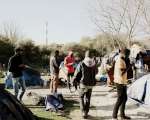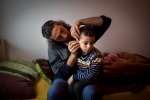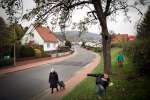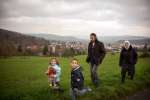UN and partners launch major aid plans for Syria and region
Press Releases, 18 December 2014
BERLIN (18 December 2014) – As Syria's war heads towards a fifth year, the United Nations and partners today launched a major new humanitarian and development appeal, requesting over US$8.4 billion in funds to help nearly 18 million people in Syria and across the region in 2015.
The appeal includes two main elements: support for over 12 million displaced and conflict-affected people inside Syria, and addressing the needs of the millions of Syrian refugees in the region and the countries and communities hosting them.
Presented to donors at a meeting in Berlin, the 2015 appeal incorporates, for the first time, significant development aspects in addition to the life-saving humanitarian needs of the largest number of displaced people in the world.
The Syria Strategic Response Plan 2015 (SRP) addresses acute humanitarian needs inside Syria, aiming to provide 12.2 million people with protection, life-saving assistance and livelihoods support. It requires $2.9 billion in funding and brings together humanitarian organizations working inside Syria and in neighbouring countries.
"Conflict has devastated millions of Syrians' lives, trapping them in conflict areas and denying them access to basic provisions and healthcare. Many live in fear, children can't go to school and parents can't go out to work," said Valerie Amos, UN Under-Secretary-General for Humanitarian Affairs and Emergency Relief Coordinator. "This plan, if fully funded, can help us provide food and medicine for children, shelter families from the cold, and support those who are desperate and traumatized. Syria is a very difficult and dangerous place to work but the humanitarian community remains committed to helping the most vulnerable people caught in this crisis."
The Regional Refugee and Resilience Plan (3RP), represents a strategic shift in the approach to delivering aid for the region. It brings together emergency humanitarian operations and host community support with longer-term programmes aimed at boosting resilience. Requiring $5.5 billion in funding to directly support almost 6 million people, it is based on planning projections of up to 4.27 million refugees in countries neighbouring Syria by the end of 2015 (representing a slight decline in the rate of outflow from Syria seen in 2014) and help to over a million vulnerable people in host communities.
"Syria's war is still escalating and the humanitarian situation is becoming protracted. Refugees and internally displaced people have exhausted their savings and resources, and host countries are at breaking point," said UN High Commissioner for Refugees António Guterres. "We need a new aid architecture that links support to the refugees with what is being done to stabilize the communities who host them."
The refugee component of the 3RP includes food aid, shelter, relief items and cash to meet basic household needs as well as registration services. The resilience component is about helping more than a million vulnerable people in communities who will benefit from assistance programmes and an enhanced focus on livelihoods and the creation of economic opportunities.
Beyond those receiving direct support, an additional 20.6 million people in Jordan, Lebanon and Egypt will benefit from upgrades to local infrastructure and services in areas such as health, education, water and sewage, training and capacity building of service providers, and policy and administrative support to local and national authorities.
"The countries hosting Syrian refugees are struggling with the massive impact on their economies, societies, and infrastructure threatening not only their stability but the stability of the entire region," said Gina Casar, Under-Secretary-General and UNDP Associate Administrator. "A traditional humanitarian response is no longer enough. The task ahead requires a comprehensive response to the crisis that builds the resilience of these communities and government institutions."
"For too long we have failed the Syrian people in the midst of the worst war of our generation," said Jan Egeland, Secretary General of the Norwegian Refugee Council, one of the key implementing partners. "2015 should be the year when we finally provide protection and relief for those caught in the cross-fire."
The Regional Refugee and Resilience Plan is available on www.3rpsyriacrisis.org
Information on the Syria Strategic Response Plan is available on www.humanitarianresponse.info/appeals
For further information, please call:
- Melissa Fleming, UNHCR Geneva, fleming@unhcr.org, Tel. +41 79 557-9122
- Ariane Rummery, UNHCR Geneva, rummery@unhcr.org, Tel. +41 79 200 7616
- Stefan Teloeken, UNHCR Berlin, teloken@unhcr.org, Tel. +49 170 416 12 29
- Boaz Paldi, UNDP New York, boaz.paldi@undp.org Tel. +1 (212) 991 8910
- Christina LoNigro, UNDP New York, christina.lonigro@undp.org Tel. +1 (917) 607 9446
- Noeman Alsayyad, UNDP Cairo, noeman.alsayyad@undp.org, Tel. +20-10-0181 1876
- Jens Laerke, OCHA Geneva, laerke@un.org, Tel. + +41 22 917 11 42, Cell: +41 79 472 9750
- Amanda Pitt, OCHA New York, pitta@un.org, Tel: +1 212 963 4129, Cell: +1 917 442 1810













































